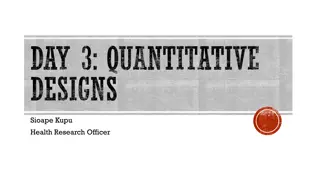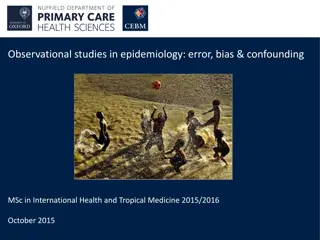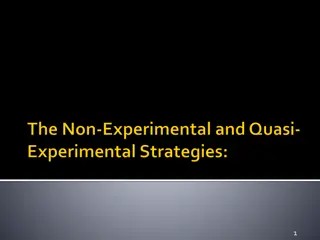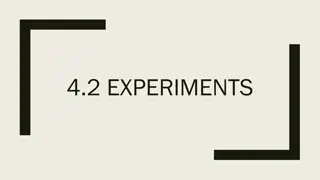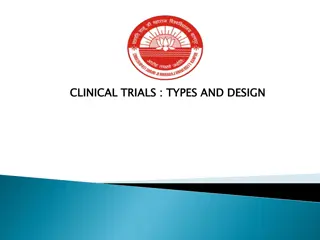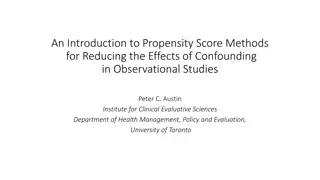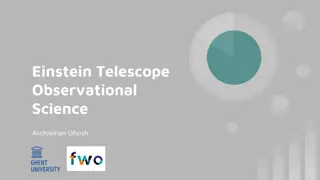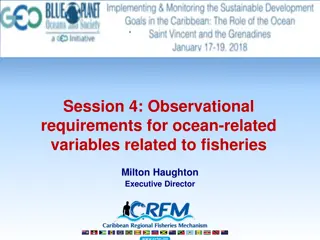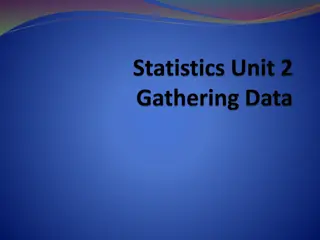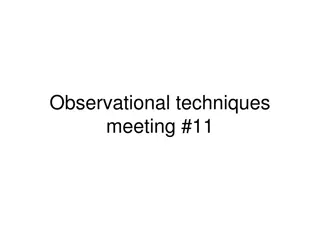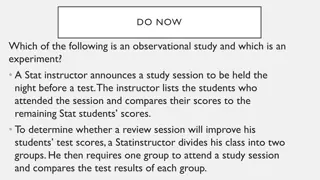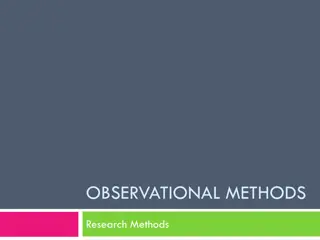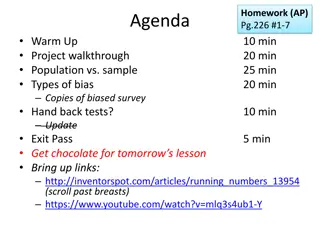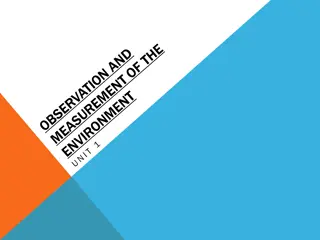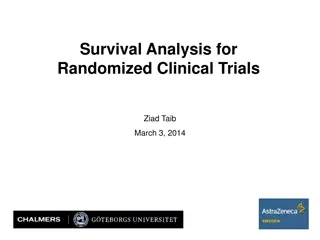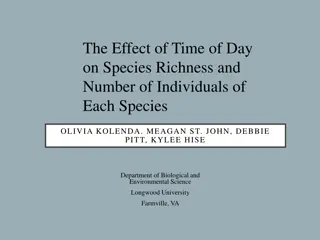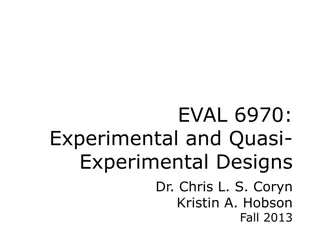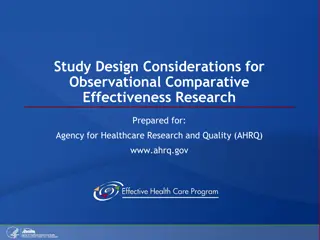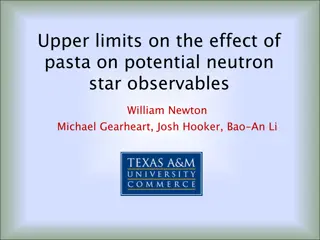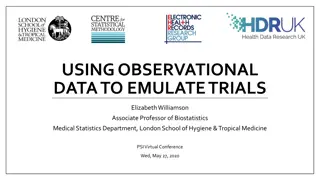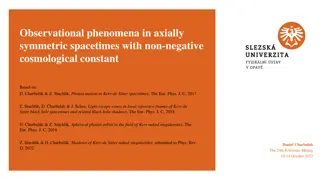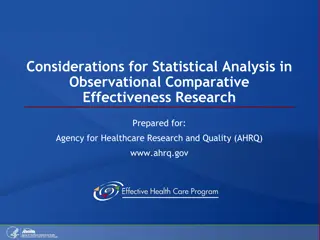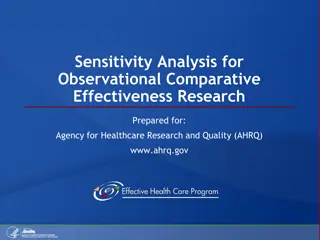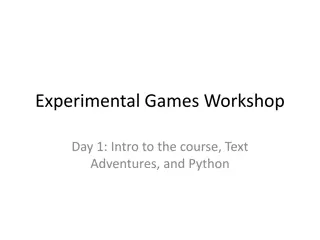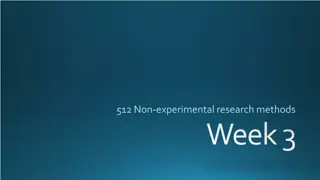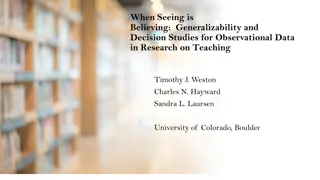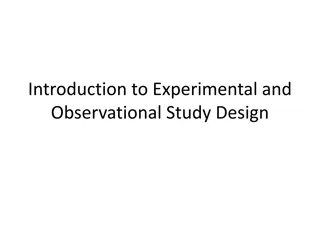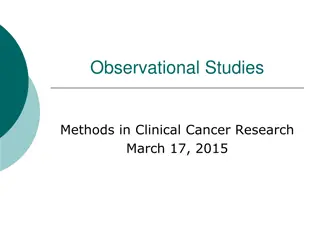Introduction to Experimental Economics by John Hey: A Comprehensive Overview
Explore the interconnected realms of Experimental Economics and Behavioral Economics through the insightful lectures of John Hey, an Emeritus Professor at the University of York. Discover the methodology of testing economic theories for validity and the practical applications of experimental economi
4 views • 58 slides
Quantitative Research Designs in Health Research
Quantitative research designs play a crucial role in health research, offering various methodologies like experimental and observational designs. Observational designs are commonly used and can establish associations but not causality. Longitudinal designs track outcomes over time, providing valuabl
4 views • 25 slides
Observational Studies in Epidemiology
Delve into the realm of observational studies in epidemiology, exploring concepts such as error, bias, and confounding. Discover the significance of various study designs, from case reports to prospective cohort studies, in elucidating associations and establishing causality in non-communicable dise
2 views • 58 slides
Nonexperimental and Quasi-experimental Studies
Nonexperimental and quasi-experimental studies resemble experiments but lack random assignment, making them valuable for group comparisons without establishing causation. This type of research design looks at differences between groups that already exist, focusing on group differences rather than ca
2 views • 35 slides
Experiments in Research: Observation vs. Experimentation
Observation and experiments are two crucial methods in research. An observational study involves observing and measuring variables without influencing responses, while an experiment deliberately applies treatments to measure responses. Confounding variables can affect the results, and factors like e
1 views • 13 slides
Clinical Trials: Types and Designs
Clinical trials are essential research studies that evaluate new tests and treatments to improve human health outcomes. They involve various phases, designs, and purposes, such as treatment trials, prevention trials, and observational studies. Different types of clinical trial designs include experi
7 views • 18 slides
Propensity Score Methods for Reducing Confounding in Studies
This content discusses the use of propensity score methods to address confounding in observational studies, comparing randomized control trials (RCTs) with observational studies, explaining the potential outcome framework, average treatment effects, and common assumptions made in these methods to re
0 views • 12 slides
Einstein Telescope: Observational Science and Board Details
Delve into the world of observational science with the Einstein Telescope (ET). This comprehensive overview covers the involvement of Flanders researchers, gravitational wave sources, ET's detection capabilities, and its significant contributions to black hole and neutron star properties. Learn abou
1 views • 12 slides
Fisheries Management and Observational Requirements for Ocean-Related Variables
This content provides insights into observational requirements for ocean-related variables concerning fisheries, focusing on marine fish production in CRFM countries, the Flyingfish Management Plan, Caribbean Spiny Lobster management, and other fisheries management plans. It discusses the main objec
0 views • 18 slides
Observational Constraints on Viable f(R) Gravity Models Analysis
Investigating f(R) gravity models by extending the Einstein-Hilbert action with an arbitrary function f(R). Conditions for viable models include positive gravitational constants, stable cosmological perturbations, asymptotic behavior towards the ΛCDM model, stability of late-time de Sitter point, a
1 views • 12 slides
Essential Elements of Clinical Trial Protocols
Understanding the key components of a clinical trial research protocol is essential for conducting successful studies. This includes identifying session objectives, discussing trial protocol contents, exploring observational study elements, and learning about reporting guidelines. Study objectives f
3 views • 25 slides
Choosing Between Observational Study and Experiment in Research
Observational studies involve recording data without interfering with subjects, while experiments impose treatments on subjects to establish cause and effect. A well-controlled experiment is crucial for determining causation, while observational studies can provide quick results at lower costs. Each
0 views • 24 slides
Overview of Observational Techniques and Student Talks in Astronomy
This content covers observational techniques, student talks, and dates related to various astronomical topics such as gamma-ray astronomy, basics of gamma-ray interaction, scintillators and solid-state detectors, Compton telescopes, and pair telescopes. It provides insights into the main processes i
0 views • 23 slides
Observational Studies vs. Experiments in Statistical Analysis
Explore the distinction between observational studies and experiments in statistics through practical examples like a Stat instructor evaluating a review session's impact on test scores. Learn about sampling methods, bias avoidance, and the implications of statistical study design. Discover how anal
1 views • 12 slides
Observational Research Methods
Observational research methods involve systematic observation of behaviors and can be used in various study designs such as experimental, correlational, and descriptive research. This type of research aims to provide insights into real-world behaviors with a focus on ecological validity. The process
0 views • 14 slides
Quantitative Research Designs in Nursing
Delve into the world of quantitative research in nursing, exploring different research designs and the concept of causality. Learn about experimental, quasi-experimental, and non-experimental designs, as well as the characteristics of experimental design like manipulation, control, and randomization
0 views • 22 slides
Experimental Design and Bias in Statistics
Explore key concepts in statistics such as observational studies, experiments, bias, and sampling methods. Delve into the difference between observational studies and experiments, understand the impact of bias in research, and learn about sampling techniques like simple random sampling and stratifie
0 views • 22 slides
Enhancing Observational Skills through the 5 Senses and Devices
Explore how the 5 senses - sight, touch, hearing, taste, and smell - interact with our environment and how observations can be enhanced using specialized devices beyond human senses. Discover examples like a graduated cylinder, microscope, spring scale, wind vane, and compass that extend observation
0 views • 146 slides
Survival Analysis in Clinical Trials
Survival analysis plays a crucial role in analyzing data from randomized clinical trials, observational studies, and experiments. It involves estimating the survival function, conducting the log-rank test, and identifying when to use this analytical approach. Elements of survival experiments, standa
1 views • 73 slides
Effect of Time of Day on Bird Species Richness and Individuals
The study investigates how the time of day impacts the species richness and number of individuals of birds at a specific feeder in Longwood University's Environmental Education Center. Through observational studies and counting, the researchers aim to determine if there are differences in bird popul
1 views • 20 slides
Experimental and Quasi-Experimental Designs
Explore the foundations of experimental and quasi-experimental designs, delving into causal relationships, counterfactual reasoning, and the importance of validating statistical and internal conclusions. Learn about causes, effects, and the complexity of determining causation in research. Discover R
1 views • 46 slides
Study Design Considerations for Observational Comparative Effectiveness Research
This presentation outlines key considerations for study design in observational comparative effectiveness research, including rationale for design choice, defining start of follow-up, inclusion/exclusion criteria, exposures of interest, outcomes, and potential confounders. It discusses various study
0 views • 16 slides
Experimental Studies in Epidemiology
Epidemiological studies and experimental studies play vital roles in understanding cause-and-effect relationships in research. Experimental studies involve manipulating independent variables and measuring dependent variables, with categories such as true experimental, quasi-experimental, and pre-exp
0 views • 22 slides
Methods for Quantifying Efficacy-Effectiveness Gap in Randomized Controlled Trials
This research discusses the quantification of the efficacy-effectiveness gap in randomized controlled trials (RCTs), particularly focusing on examples in Acute Respiratory Distress Syndrome (ARDS). It explores the challenges of RCTs, ethical considerations, and the use of observational data for caus
0 views • 8 slides
Pasta Phase in Neutron Stars: Upper Limits and Observational Effects
Investigating the impact of pasta phase on neutron star observables, this research by William Newton, Michael Gearheart, Josh Hooker, and Bao-An Li discusses the crust composition, transition densities, and compressible Liquid Drop Model (CLDM). The study explores the uncertainties in symmetry energ
0 views • 30 slides
Using Observational Data to Emulate Trials
Elizabeth Williamson, Associate Professor of Biostatistics, discusses the use of observational data to emulate trials, providing valuable insights for informing future randomized controlled trials (RCTs) and hypothesis generation. The examples presented demonstrate how routinely collected data can c
0 views • 38 slides
Observational Phenomena in Axially Symmetric Spacetimes with Non-Negative Cosmological Constant
This study delves into observational phenomena in spacetimes with non-negative cosmological constants, focusing on photon motion, Kerr-de Sitter geometries, and shadows of Kerr-de Sitter naked singularities. Explore related concepts such as spherical photon orbits, measuring NS spin, and equations o
0 views • 18 slides
Considerations for Statistical Analysis in Observational Research
Careful statistical analysis is crucial in observational comparative effectiveness research to address confounding factors. This involves descriptive statistics, unadjusted analyses, traditional regression models, propensity scores, instrumental variables, and more.
0 views • 15 slides
Sensitivity Analysis in Observational Research
Observational studies rely on various assumptions, and sensitivity analysis helps assess the impact of these assumptions on study results. Explore key aspects such as unmeasured confounding, comparison groups, exposure definitions, and more.
0 views • 16 slides
Experimental Games Workshop: Intro to Text Adventures & Python
Welcome to the Experimental Games Workshop Day 1! Join us for an introductory course exploring Python for text adventure games and other exciting topics like game design, microcontrollers, and more. Collaborate with peers, engage in teamwork, and dive into experimental game development. Get ready fo
0 views • 19 slides
Non-Experimental Research Methods: Understanding Types & Techniques
Experimentation in research involves controlled settings and manipulation of variables to establish cause-and-effect relationships. On the other hand, non-experimental methods like observational studies, surveys, and archival research do not involve direct manipulation and control. This comparison e
0 views • 24 slides
Experimental and Intervention Studies: Understanding Study Designs
In this informative content, you will explore experimental and intervention studies led by Dr. Rashmi Katyal. Learn about study methodologies, the value of experimental studies, types of intervention studies, and the hierarchy of evidence. Discover the significance of experimental study designs and
0 views • 52 slides
Introduction to Experimental Studies in Clinical Trials
Clinical trials play a crucial role in advancing medical research by evaluating experimental treatments through various study designs. This introduction explores the definition of clinical trials, the importance of experimental studies, different types of experiments, principles of experimental desi
0 views • 63 slides
Statistical Analysis of Data in Experimental Physics
Explore the fundamental principles of statistical analysis in experimental physics, covering topics such as measurement, model, random variables, sampling, errors, and regression analysis. Understand the importance of uncertainties, significant figures, and systematic errors in experimental data int
0 views • 34 slides
Characteristics of Experimental Studies: Manipulation, Control, Randomization
Understand the key elements of experimental studies, including manipulation, control, and randomization. Experimental designs are recognized as the gold standard for inferring causal relationships, making them crucial in research. Identifying if a study is experimental involves looking for specific
0 views • 34 slides
Experimental and Quasi-Experimental Designs Overview
Explore the concepts of experimental and quasi-experimental designs, including basic elements, measurement techniques, comparison groups, treatments, and notation. Learn about the limitations of designs lacking control groups or pretest observations, simple strategies for improvement, and why such d
0 views • 34 slides
Understanding Experimental Design Terms: CRD, Experimental Unit, Replicate, and Block
Explore the meanings of experimental design terms like CRD, experimental unit, replicate, and block. Learn how these terms are essential in statistical analysis and experimental research.
0 views • 12 slides
Understanding Generalizability and Decision Studies in Observational Research on Teaching
Explore the importance of observational data in educational research, focusing on generalizability and decision studies for teaching practices. Learn about the design, validation, and reliability assessment using observational protocols and statistical techniques.
0 views • 12 slides
Understanding Experimental and Observational Study Design
Explore the fundamentals of experimental and observational studies, including the distinction between units in experimental and observational studies, factors, treatments, and randomization processes. Learn about completely randomized and blocked designs, as well as standard experimental design appr
0 views • 8 slides
Methods in Clinical Cancer Research: Observational Studies and Experimental Designs
Explore the methods used in clinical cancer research, including observational studies like prospective cohort and case-control studies, as well as experimental designs focusing on controlled exposure and treatment variables. Understand the differences between observational and experimental approache
0 views • 58 slides

